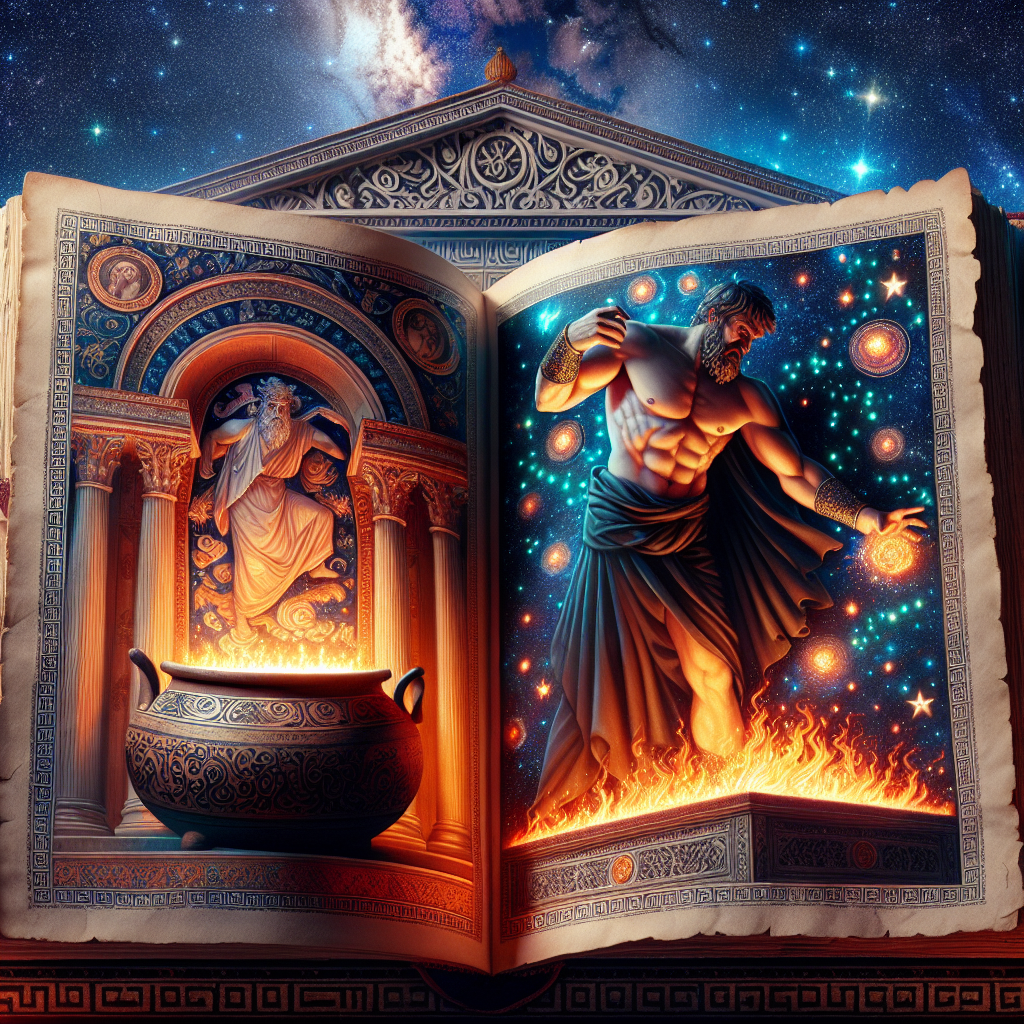The Origins of Creation: Greek Myths Explained
Greek mythology is a rich tapestry of stories and characters that delve into the origins of the universe, humanity, and the gods who govern it. These myths served not only as a means of entertainment but also as a way to explain the mysteries of existence, natural phenomena, and human emotion. At the heart of these myths lies a narrative about creation that raises profound questions about existence and the nature of the divine.
The Primordial Chaos
The story of creation in Greek mythology begins with Chaos, an empty void that existed before anything else. Out of this primordial chaos emerged the first entities, Gaia (Earth), Tartarus (the abyss), Eros (Love), and Erebus (Darkness). These beings are not mere deities but represent fundamental aspects of existence itself.
Gaia, or Mother Earth, is particularly significant as she personifies the planet and all life upon it. She is often depicted as a nurturing figure, showcasing the duality of creation — she can give life and destroy it. With her, the mythological lineage begins, as she eventually gives birth to the Titans, powerful deities who will play a crucial role in the unfolding drama of creation.
The Emergence of the Titans
Gaia’s union with Uranus (the sky) produces the Titans, twelve powerful entities, including Cronus, Rhea, Oceanus, and Hyperion. Each Titan has dominion over various aspects of the world and is central to the narrative arc of Greek mythology. However, the relationship between Gaia and Uranus is fraught with tension. Uranus, fearful of his offspring, imprisons them within Gaia, provoking her anger.
In retaliation, Gaia births the monstrous Titan, Cronus, and provides him with a sickle. Cronus then overthrows Uranus, thereby freeing his siblings. This violent act not only establishes a new order of deities but illustrates the recurring theme in Greek mythology: the cyclical nature of power and rebellion. Cronus becomes the leader of the Titans, symbolizing a new era that will soon be challenged.
The Rise of Zeus and the Olympians
Cronus, however, is a fearful dictator who learns from his father’s mistakes. He swallows his children, fearing that one of them will rise up against him. His wife, Rhea, horrified by this practice, saves their youngest son, Zeus, by hiding him in a cave on the island of Crete, replacing him with a stone.
Zeus eventually grows up, leading a revolt against Cronus and the Titans in a cosmic clash known as the Titanomachy. With the help of his siblings, he overthrows Cronus and releases the swallowed siblings, marking the dawn of a new era: the reign of the Olympian gods. These narratives not only chronicle the rise of Zeus but also underscore themes of justice, power, and the inevitability of succession.
The Creation of Humanity
With the Titans defeated, Zeus, along with his brothers Poseidon and Hades, divides the realms of existence. Zeus takes the sky, Poseidon the sea, and Hades the underworld. However, with the formation of order comes the question of humanity.
Two accounts of the creation of humanity emerge in Greek mythology. The first is attributed to Prometheus, a Titan known for his intelligence and compassion. He molds humans out of clay and breathes life into them. Prometheus’s creation reflects the divine spark within humanity—a dual nature of greatness and downfall.
However, Prometheus’s gift to humanity, the secret of fire, leads to dire consequences. Zeus, angered by the Titan’s defiance, punishes Prometheus by binding him to a rock where an eagle eats his liver daily, which regenerates overnight. This myth emphasizes the complexities of human existence: the pursuit of knowledge often comes with sacrifice.
Pandora and the Plague of Evils
To remedy humanity’s burgeoning independence and potential challenge to the gods, Zeus creates Pandora, the first woman, as an extension of vengeance against Prometheus. She is gifted with beauty and curiosity but carries a jar (often mischaracterized as a box) containing all the evils of the world. When Pandora, unable to resist her curiosity, opens the jar, she unleashes pain, sorrow, and despair into the world. However, she leaves hope trapped inside.
This myth serves as an important social and philosophical commentary on the nature of human existence. While suffering and struggle are inevitable, hope remains a vital lifeline, allowing humanity to endure despite its trials.
The Nature of the Divine
What makes Greek myths uniquely captivating is their portrayal of gods who embody both ideal qualities and human flaws. The Olympian gods exhibit jealousy, love, power struggles, and a desire for control—mirroring the human experience. This relatability helped ancient Greeks navigate their realities while fostering a greater understanding of their relationship with the divine.
The Olympians were not distant beings, but instead, they were intimately intertwined with human affairs, offering a framework within which to understand both creation and destruction. The myths also subtly promote moral codes and societal values through cautionary tales of hubris, sacrifice, and the importance of hospitality.
Conclusion
The origins of creation in Greek mythology present us with an intricate narrative that explores the birth of the universe, the emergence of deities, and the formation of humanity. From the chaos that began it all to the complex relationships between the gods and mortals, these myths encapsulate deep philosophical questions about existence, power, and the human condition.
Whether through the tragic suffering of Prometheus or the hope symbolized by Pandora’s jar, Greek myths resonate with audiences across centuries. They offer insights into how ancient civilizations made sense of their world, providing a lens through which to view the fundamental questions that continue to perplex humankind today. As we explore these ancient stories, we find not just legends of the past but timeless reflections on our own lives and the world we inhabit.






